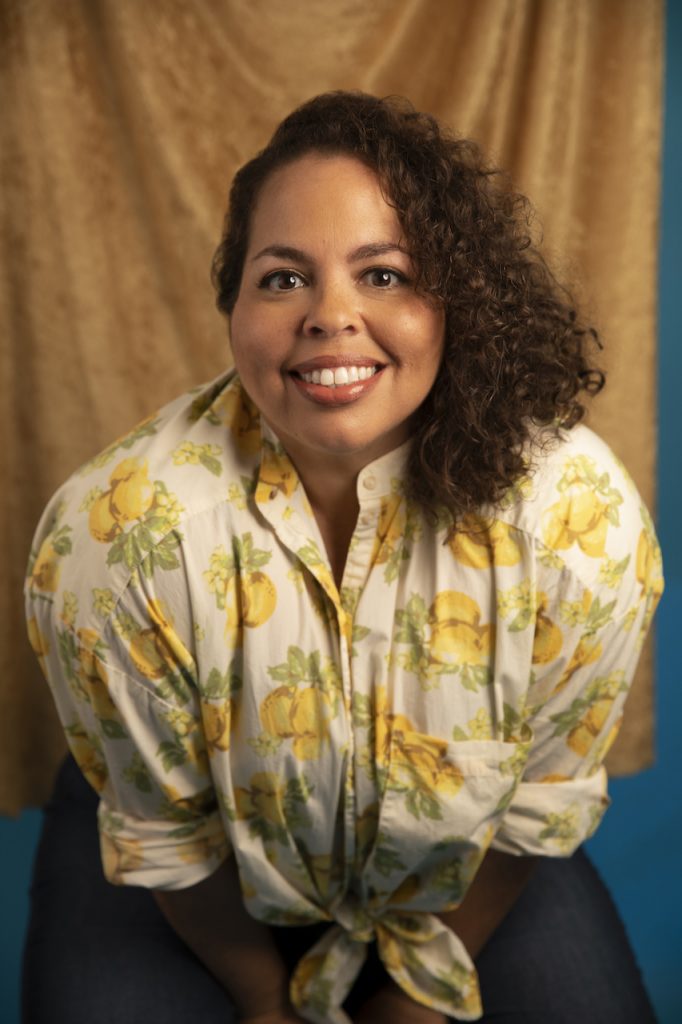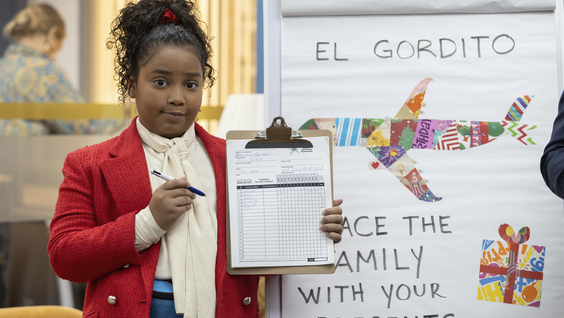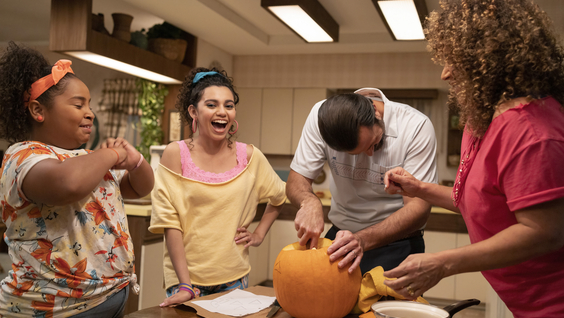It’s a story lived and related to by millions and yet, until recently, was shared quite rarely on either the small or big screen. But in Gordita Chronicles, creator Claudia Forestieri (Selena: The Series) puts a comedic, yet sweetly honest spin on the immigrant experience, based on what she knows best – her own life story.
Starring Diana Maria Riva and Juan Javier Cardenas, Gordita Chronicles is told from the perspective of a Latina reporter reflecting on her childhood as part of a Dominican family growing up in 1980s Miami. Forestieri and showrunner Brigitte Muñoz-Liebowitz (People of Earth, Brooklyn Nine-Nine) first met through NBC’s Writers on the Verge program and their common experiences solidified a friendship that led to professional collaboration. Together they are the first female Latinx showrunner and creator duo on this series that is executive produced by Zoe Saldana and Eva Longoria.
Tell me about meeting through the Writers on the Verge program and your individual paths that led there.
Brigitte: I think I applied three times before I got in. The first time I applied, I had just come to L.A. from New York. I had been working in production as a line producer/production manager and I wanted to transition back into writing. I heard about the lab and thought it would be a great opportunity.

Brigitte Muñoz-Liebowitz
So I did my application and I definitely struggled through it! The hardest part of the application for me actually wasn’t the writing samples; it was the personal essays and personal statements… I found those to be really difficult. I didn’t really know how to talk about myself. I didn’t know if that was a factor of age, or just never having had that opportunity. Or to know what was unique about my perspective. I mean, it’s one of those really deep therapy conversations where you’re like “why didn’t I know myself enough?”
I actually think it’s a skill. What I think really helped make a difference for me was that even though I had my formal education, I kept taking classes – comedy classes and writing classes – to just keep getting better.
I had the opportunity to read an essay or two of the people who did get into the program and I saw what they had done. I also checked out a book of college application essays, and the samples I read weren’t like what I had been doing. I knew I wanted to write for TV and talk about my family background. But I think what was really missing was my voice and perspective. In those essays I read, I could really know who the writers were when I read them. I’d get a feel for their sense of humor, their neuroses, their hang-ups… I got a little bit of a taste of everything and it made me want to know them more.
I realized that I had been writing these essays very seriously, very earnestly, which must have been a really big turn off for anybody reading them.
And so the essays that I wrote for the year that I got in, weren’t actually essays. They had asked for statements, but I said, “You know what I really like? Poetry.” I wrote my autobiographical statement as a sonnet and my personal statement as a series of haikus. I think it was just weird enough to make it intriguing! That was my experience getting in.
Claudia: For me, I had been in L.A. for about four years by then. I think it was my fourth time trying to get in… and I was also very perplexed by the essay!
I don’t know where I got this idea, but since I had applied unsuccessfully all the other times, I took the route of linking work at Telemundo; that’s where I was at the time and NBC owned Telemundo.
I think my opening line was something along the lines of “ever since I’ve been a little kid, I’ve been nosey” and then I talked about loving gossip and knowing stories and how that led to a career in journalism. And how that led to my present day where I was trying to break into telling these narrative types of stories.
I rather boldly reached out to people at NBC because I had access to emails through Telemundo. But I was able to meet with people and get advice about working on my craft. A few months later, I found out I made it to the final list. I guess I felt a bit more comfortable navigating all those interviews and I was just so happy to have gotten so far after years of applying.
The irony is that when I got in, I was working in the newsroom at Telemundo. I just wanted to scream and tell everybody… but then I was scared. I thought “Oh my god, I feel like this superhero with two identities.” I was supposed to be a news girl – how were my bosses going to react to me pursuing this other track? I remember it being agonizing waiting hours to get out of work so I could celebrate.
When you met, what were some of the commonalities, and maybe even some of the differences, you saw in each other that made you want to collaborate?
Claudia: I’ll say this because she won’t say it… Brigitte only lasted in the program a few weeks because by then, word of her genius had gotten around town. She had been at it for a while and she was really skilled and so funny and so freaking talented. She was on Brooklyn Nine-Nine within weeks of the program starting.
But I immediately sensed that we had something in common even before we met, because we both wrote specs of girls to get in, and we were the only two Latin writers in the program. And there was one other comedy writer. We had that in common and I immediately thought she was the coolest.
Brigitte: There weren’t any Latinas that I had ever come across in our line of work at all. Even while I was in production in New York. There were very, very few people of color. I could count them on one hand.
And so to meet another woman who was doing comedy and writing was very special and precious. I remember we went out for lunch and talked forever because we realized we had so much in common in that way. It was really nice to finally see someone who had shared some of those experiences and culture.
When we reconnected later and I read Claudia’s script, I saw so much of my family in that story too. It’s her very specific story, but the life experiences are reminiscent of so many other people, including my family’s, that it was just so easy to connect to. The characters that she had written and created were so loving and warm that I was immediately charmed and endeared by them.
What do you think has changed in the industry that has opened the doors for TV shows like this one?
Brigitte: I think more immigrants have more money now and more purchasing power. I think we have a big chunk of the market and they want our money, which is great. It might sound cynical, but I’m glad about this, I really am. I think that, with that, comes some respect.
I think there are so many of us now that we just can’t be ignored anymore and I think there’s been a lot of progress in terms of visibility in the world because of social media, TikTok, etc. And now we’re all aware that we exist. The borders that sort of prevented us from seeing each other (like distance and access) aren’t so much the case anymore and people want to see. And I think people have a platform to be loud and demand it. Companies are not representing their customers, and I think that’s a really big part of it. I’m grateful for those people who have been vocal about it, because now we have an opportunity. People are interested in hearing our stories.
I think that’s my sort of my view on it from a business perspective.
Claudia: I mean, thank God for Gen Z and millennials that are so savvy on social media! Because Gen X-ers are a little bit more used to abuse, I guess. I’m ten years older than Brigitte, so sometimes I’ll say to her that that’s more of the dynamic we need.
Also, we’re in this streaming era; of course I’m biased, but I think this show could have been on a major network. You know, in the 90s or in the 2000s. Realistically, we know the climate in the industry, but I like to think that this show could have been up somewhere that wasn’t streaming.
Of course I’m very grateful to HBO Max and thank God for streamers because they’ve expanded the landscape. There are so many shows now that, if it wasn’t for the streaming era¸ I don’t know would have ever made the light of day. There would have been concern about generating enough of an audience, even though Latinos have been a huge part of the population for decades.
Brigitte: I’ll add a caveat to what I said, which is that I do think part of it is that the people at the creative executive level are now seeing more people of color in those positions where they weren’t before. And people who are progressive and open-minded, like our execs at HBO Max, are very much of the mindset that they want to tell diverse stories. It’s genuinely what they care about. And so we’re grateful for that.

Carlota ‘Cucu’ Castelli (Olivia Goncalves) Photo by Laura Magruder/HBO Max
You both have quite diverse career backgrounds and experiences. What would you say are some of the things you’ve learned from your previous projects and from writers’ rooms that you’ve been in over the years?
Claudia: My first career was working for TV news for Telemundo as a reporter and then later as a producer. What I learned in news was to respect deadlines… and also that no matter the topic of a story, you should never bore the audience. You always had to keep them entertained.
I also learned how to tell stories about ethnic minority characters, people of color characters, strong women… leaning into the specificity of the character and their cultural background, but in a way that also makes it universal. That’s something that I got practice on while writing Good Trouble and in Selena: The Series.
Something that I learned from multiple programs (Writers on the Verge, HBO Access and the Disney ABC writers programs) was to be vulnerable and open with your own life story; and to mine your own story for material. That’s something that can be tough. When I first wrote Gordita, it was tough because that was a sad, very strange, kind of borderline traumatic time in my life. Everything just changes and you realize, “Oh my God, I don’t really have control over my life… I just have to go wherever my parents go.”
Those stories, the ones that you don’t want to talk about, are usually the ones that make the best stories.
Brigitte: I would also say, Claudia, that I think you have some other strengths as well, in that you’re very tenacious, which I imagine partly comes from your reporter background. Whenever somebody would say “Oh no, that’s not possible, I don’t think we can do that”, you would always look for a way to make it work. Which has been really great; it’s a really good producing skill that I think comes from finding different angles to a story. I see it come out when we’re breaking story sometimes too.
For me… as I mentioned, I have a line producing background and I worked in indie films and commercials in New York. That’s also very much something from nothing on a shoestring budget and I had a lot of experience with it. I worked under a line producer as her assistant for many years, and learned a lot from her. I understood intimately what production was like before I even became a TV writer. I understood what the constraints of a script could be as it was being written, because in my mind I was doing a stripboard and a breakdown… and I knew how long things would take and what would be required.
I was also always pretty good at doing revisions as a younger writer because I could figure out how to condense things logistically as well as creatively. I also knew how to read budgets, which I think a lot of writers don’t ever get the chance to learn, unfortunately; and then they find themselves in a show running position and they’re at the mercy of somebody else who they just hope is a trustworthy partner. That’s the logistical producing side of things.
In terms of comedy, I feel like I had some really good education from my earlier jobs. Brooklyn Nine-Nine being one, People of Earth being another. People of Earth, especially, was a very playful environment and we did a lot of voices. We also acted things out, which then became a way that I learned how to break story; by inhabiting characters, or doing little bits in the room. That was really helpful because it kept things light and silly. And there’s something a little bit different about when you can physicalize something.
As Claudia said, mining life story was something I learned from the workshops as well. We rely a lot on our own lives for our stories.
Something else I learned, more from my improv and sketch comedy classes than from previous work was the importance of warmups. It sounds strange, but in our writers’ room we had a good half hour of warmups in the morning. They were fun – like improv games or charades, or even just getting everybody moving and thinking and playing and being in their bodies. That really helps people feel comfortable and get to know each other more… and it just starts the day out on a fun, funny creative note.
What’s something you have learned from this specific project?
Claudia: Collaboration and patience, because we’ve been working on this for so long. It always felt like “Oh my God, is anybody going to be able to see it?” This was my first time as a TV show creator, so the first time that I’ve been through all of the cycle. Thank God for Brigitte because this was my first comedy room.
When I was accepted for Writers on the Verge it was with comedy, but then I veered off into dramedy. This whole experience and working with Brigitte has taught me to be a little bit more fearless in my comedy. I realized through this process that I have a fear of not looking professional. And when you want to do comedy, you have to be you. You can’t be scared of looking silly because that’s where the best jokes come from. We had so many amazing comedy writers in our room, and I was sometimes a little bit intimidated. It was like I was like funnier on the page where nobody could see me and I didn’t have to hear the silence when a joke didn’t work, you know?
Brigitte is a perfectionist and things can always be funnier and pithier. I’m always watching for the deadline and I’ll say “this, do it” and she’ll say “no, it has to be amazing. It has to be perfect – if we need more time, we need more time.”
Brigitte: I think I’ve learned about how far I can push myself physically. I know it sounds dramatic, but you hear about what writers’ rooms are like, and all of those late nights. We never had late nights as a writers’ room. We made sure everybody went home and had a life.
But Claudia and I didn’t care about late nights. Production was incredible, but also grueling. I think we really cared so much about this project that we pushed ourselves as hard as we could.

